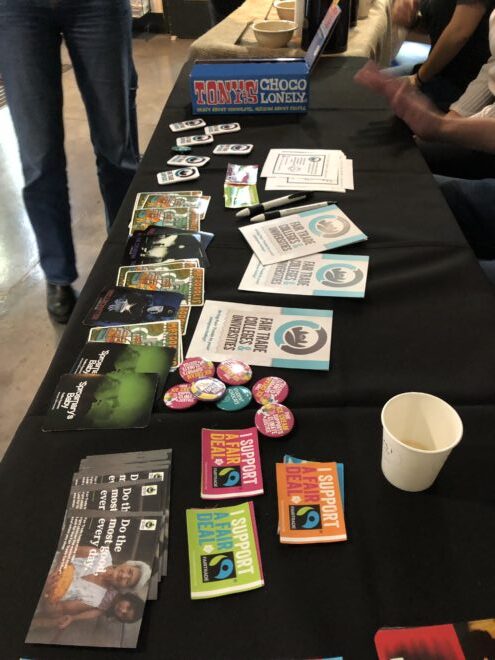Campus News
UCSC achieves fair-trade status through the work of students
UC Santa Cruz passed a fair trade resolution that reflects its commitment to join the efforts of the Fair Trade Colleges & Universities, a division of Fair Trade Campaigns.


Ericka Elphick was a sophomore at UC Santa Cruz when friends she’d shared a hall with during her freshman year in the Porter College dorms asked if she’d join a fair-trade movement. Over the next two years, they built a team, attended conferences, hosted outreach events, and launched a grassroots campaign to highlight sustainability and social justice issues.
It wasn’t easy. Most people didn’t know that even a small change in their daily habits, such as opting for a cup of fair-trade coffee, could have global implications. They didn’t realize that the growers of the coffee, tea, chocolate and other products they consumed might be paid less than a living wage and that child labor may be involved, especially in Latin America, Africa, and Asia. And they weren’t aware that conventional means of growing coffee and other commodities are often damaging to the environment, harming local ecosystems.
By the time Elphick was a senior, her friends from the campaign — Saajia Bidar, ’20, and Sofía Wildvine, ’19 — had graduated. She’d moved back home, to El Sobrante, for remote learning, and it would have been easy for all their efforts to fade away during the COVID–19 pandemic. But she reminded herself there was one big one box left to check: Pass a Fair Trade Resolution through the chancellor’s office.
So, while she was on a hike at the beginning of winter quarter, Elphick was emboldened to email Sarah Latham, vice chancellor for Business and Administrative Services. And she answered.
Latham said she was immediately struck by the approach Elphick took with her outreach.
“Ericka was both passionate about the topic and pragmatic about how to implement it on our campus,“ Latham said. ”She had clearly done a lot of homework on the topic, and by the time the proposal made it to campus leadership, it was already a very well-thought-out proposal.”
Latham said she supported the values embedded in the proposal and that it was an honor to help to get the resolution finalized and signed.
“We shared the proposal with the key offices across campus that would have responsibility for aligning business practices with the commitment,” Latham said. “All units were very supportive and had already implemented several practices that align with the commitment. When I took the proposal to the chancellor, I was able to articulate broad support.”
On March 12, UC Santa Cruz passed a Fair Trade Resolution that reflects its commitment to join the efforts of the Fair Trade Colleges & Universities, a division of Fair Trade Campaigns, which recognizes towns, colleges, universities, schools, and congregations in the U.S. for embedding fair-trade practices and principles into their social and intellectual foundations and policies.
Simply put, fair-trade practices help protect both workers and natural resources from the exploitation that comes along with the high demand of a capitalist economy. The rigorous standards of fair trade link poverty reduction and environmental conservation, giving consumers confidence that the people behind the products they buy get fair wages for their work and safe working conditions, and that environmentally sustainable production will be practiced.
Here are some of the changes that will bring forth on campus, whenever possible:
- Fair trade coffee, tea, chocolate, and other fair trade products will be available in the dining facilities, at catered meetings and in administrative and faculty offices.
- Fair trade food products, apparel and handicrafts (such as jewelry, and other gift items) will be available in the campus store.
- The college will support students, staff, and faculty working to increase on-campus awareness of reliably sourced products through events, in curricula, and other efforts.
“The proposal is in strong alignment with our campus values of social justice and environmental stewardship,” Latham pointed out. “Every unit and campus leader I engaged with to get the resolution finalized is very supportive of the initiative. Our Sustainability Office will take the lead in assessing our progress.”
As Elphick prepares to graduate with a degree in psychology, she’s uncertain about her future career path. But she knows her work in the fair-trade movement will have a lasting and expansive impact.
“Fair-trade products support workers and natural resources to prevent exploitation,“ she said. ”When supported by a large institution like UC Santa Cruz — or, even better, the whole UC system — the purchases of fair-trade products will have a major ripple effect. It’s very exciting!”